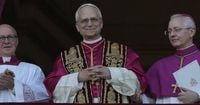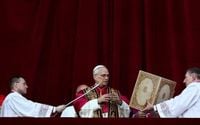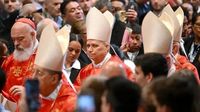VATICAN CITY (AP) — On May 8, 2025, Cardinal Robert Prevost was elected as the new head of the Catholic Church, taking the name Pope Leo XIV. This historic moment marks him as the first pope from the United States, a significant milestone given the long-held taboo against an American pontiff.
Prevost, 69, was brought to the Vatican by Pope Francis in 2023 to lead the office responsible for vetting bishop nominations. His broad experience in the church, particularly in Latin America, positioned him as a prominent candidate in the conclave, where he was elected after just four ballots, a swift decision made by 133 electors from 71 countries.
Born in Chicago on September 14, 1955, Prevost’s journey to the papacy has been shaped by his deep commitment to service and education. He graduated from Villanova University with a Bachelor of Science in 1977 and joined the Order of St. Augustine that same year. After completing his studies in theology and canon law, he was ordained at the age of 27.
His early years in Peru were marked by missionary work, where he served as a parish priest and lecturer, significantly contributing to the Augustinian mission in Chulucanas, Piura. Prevost returned to the U.S. in 1999, eventually becoming the head of the Order of St. Augustine from 2001 to 2013. He later returned to Peru, where he was appointed bishop of the Chiclayo diocese in 2015.
In 2023, Prevost was elevated to cardinal and appointed as the prefect of the Dicastery for Bishops, a role in which he played a crucial part in reforming the bishop nomination process by including women in the voting bloc. This reform was one of the most revolutionary changes initiated by Pope Francis.
Prevost’s election is seen as a potential balancing act within the church, as it comes amidst growing ideological divisions between progressive and conservative factions. He has been described as a candidate of the “middle way,” reflecting both the inclusive vision of Pope Francis and the traditionalist voices within the church.
During his first speech from the balcony of St. Peter’s Basilica, Prevost emphasized the importance of peace, stating, "Peace be with you all." He urged the church to be a synodal community that seeks mercy and closeness to those who suffer. His words resonated with thousands gathered to hear his message, a testament to the hope many have for his leadership.
Prevost holds a unique position as a leader who speaks fluently in English, Spanish, and Italian, making him relatable to a diverse global congregation. His background in education and pastoral care is expected to influence his papacy, as he aims to address pressing social issues and foster dialogue within the church.
In a nod to his predecessor, Prevost expressed gratitude to Pope Francis for his guidance and the path he has laid for the church. "We must be a church open to all and serve as a bridge for dialogue," he said, echoing themes of inclusivity and compassion.
As the bells of the Vatican tolled to announce his election, celebrations erupted in Peru, where Prevost has strong ties. Many Peruvians expressed pride in having a pope who represents their country. Isabel Panez, an elementary school teacher, remarked, "For us Peruvians, it is a source of pride that this is a pope who represents our country. We would like him to visit us here in Peru."
The new pope’s ascent comes at a time when the U.S. Catholic Church is sharply divided between conservatives and progressives. Prevost’s leadership style is expected to be characterized by a commitment to social issues and a focus on serving marginalized communities.
However, he also carries a reputation for a more conservative stance on certain issues, having previously expressed critical views on same-sex relationships and sexual education in schools. Observers note that while Prevost shares some similarities with Francis, he may not fully embrace the more progressive elements of the current papacy.
Marco Politi, a journalist specializing in Vatican affairs, commented on Prevost’s election, stating, "If Prevost were not American, he would automatically be on the list of papabile, given his international experience and work within the Vatican hierarchy."
Prevost’s election is not just significant for the U.S. Catholic Church but also for the global Catholic community, as he navigates the complexities of modern faith in a rapidly changing world. His commitment to social justice, pastoral care, and interfaith dialogue will likely define his papacy as he seeks to unite a diverse church amid ideological tensions.
As the world watches, Pope Leo XIV steps into a role that could reshape the future of Catholicism, bringing with him a blend of American pragmatism and a rich heritage of service in Latin America. His journey from the streets of Chicago to the Vatican is a remarkable testament to his faith and dedication.
With his election, many are hopeful for a renewed focus on peace, unity, and compassion within the church. As Prevost himself stated, "We are all in God’s hands, united and moving forward without fear." The global Catholic community awaits to see how his leadership will unfold in the years to come.



